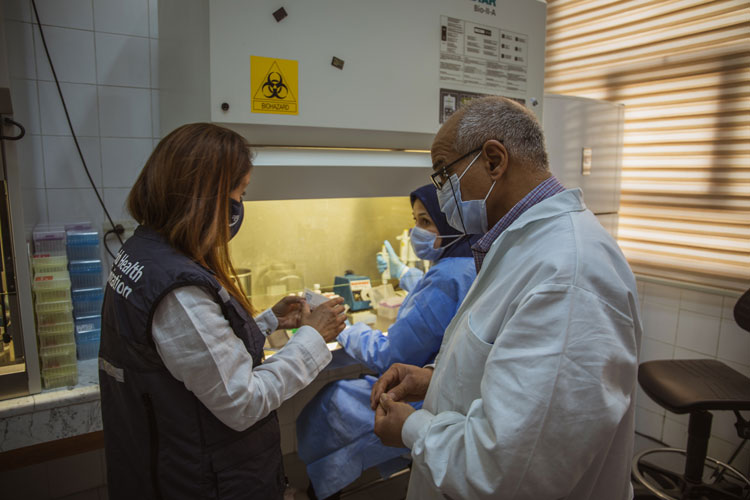 Cairo, 1 August 2021 – The WHO Regional Office for the Eastern Mediterranean conducted a field visit to Libya during the last week of June to assess the laboratory and surveillance network against COVID-19, as well as influenza-like illnesses (ILI) and severe acute respiratory infections (SARI). The mission visited the National Centre for Disease Control, the national reference laboratory for COVID-19, primary health care facilities and hospitals.
Cairo, 1 August 2021 – The WHO Regional Office for the Eastern Mediterranean conducted a field visit to Libya during the last week of June to assess the laboratory and surveillance network against COVID-19, as well as influenza-like illnesses (ILI) and severe acute respiratory infections (SARI). The mission visited the National Centre for Disease Control, the national reference laboratory for COVID-19, primary health care facilities and hospitals.
Soon after the COVID-19 pandemic broke out, the Ministry of Health and the National Centre for Disease Control established a national laboratory committee for COVID-19 with the main objective of expanding and enhancing laboratory diagnostic capacities across the country. The public health reference laboratory, hosted by the National Centre for Disease Control, started testing for COVID-19 in February 2020 using the Rt-PCR kits provided by WHO. The committee rapidly mapped subnational laboratories with the ability to conduct molecular diagnostics using PCR and identified and supported 9 subnational laboratories for COVID-19 in public health, animal health and other sectors. The network was later expanded and currently includes 25 laboratories in around 20 cities. At the time of the mission, the COVID-19 laboratory network was processing about 21 125 tests per week with a positivity rate of 8.3%, with 98.2% of tests performed in the west of the country as opposed to the east and south regions.
Unfortunately, there is no national reference laboratory designated for COVID-19 that leads and supervises the technical aspect of the network. Monitoring and evaluation of COVID-19 testing within the network is essential, particularly to ensure the quality of test results and for the prompt identification and correction of problems at new sites and during the scaling up of testing. Therefore, it is important to designate one national reference laboratory to lead the overall technical support and monitor the quality of tests within the network.
Since the start of the pandemic, the public health reference laboratory stopped all other activities and redirected all human and financial resources towards COVID-19 testing and this has negatively impacted many other programmes, like HIV and outbreak investigation of other diseases, with the laboratory stopping to procure kits for testing priority emerging and re-emerging pathogens. During discussions with the Director of the National Centre for Disease Control and the responsible surveillance department, it was agreed that the reactivation of ILI surveillance and the establishment of SARI sentinel surveillance should be a priority to understand the epidemiological situation and circulation of seasonal influenza. WHO is committed to supporting the capacity-building of laboratory staff, external quality control and procurement of kits in the country.








